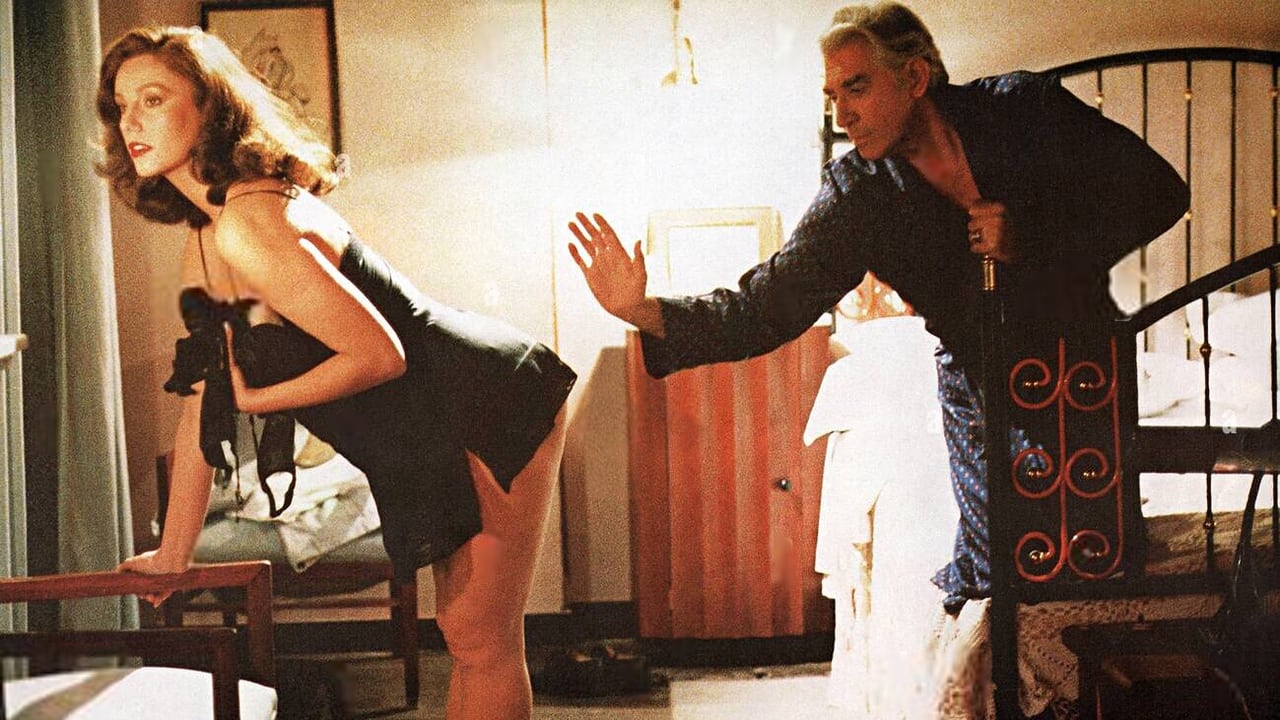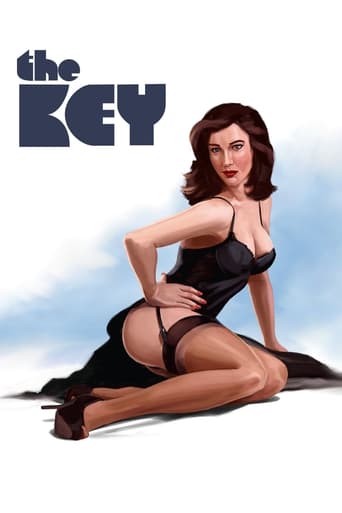



Purely Joyful Movie!
not horrible nor great
A waste of 90 minutes of my life
The film never slows down or bores, plunging from one harrowing sequence to the next.
View MoreTHE KEY is another erotic drama from one of the kings of the genre, Tinto Brass. It's a film which is all about sex, sex, and more sex, with little plot otherwise, although the characterisation is better fleshed out than I imagined. The film has a classy, well-shot look which lifts it above sleazier movies by the likes of Jess Franco, but there's not much content and it does feel repetitive. It also feels a lot like one of the Japanese erotic movies that have been popular for the last fifty years. Frank Finlay is a surprise presence in this film; this British character actor is the last person you'd expect to see baring all for such a production, but there he is. Stefania Sandrelli gives the stand-out turn in a very explicit performance that must have been a real test of nerve for the actress.
View MoreJust from the opening scene it's evident that Tinto Brass is in a class of his own as a filmmaker. A beautifully shot period piece in which an ageing husband gets aroused by his wife falling for her daughter's boyfriend (kind of a ménage a quatre), simply because it arouses him to see his wife aroused. I'm not into cuckolding, but it's actually a sweet, romantic film in a way, just with a lot of visual fawning over women's exposed buttocks. Tinto Brass is like that. I've heard about him but not really seen much so far. I'm glad this is beginning to change.
View MoreIn Salon Kitty, director Tinto Brass showed an Authoritarian-fascist government exploiting the sexual secrets of its people in order for reasons of control and manipulation; in The Key, set in Venice just before the outbreak of the second world war, Brass shows sexual transgression as a means of escaping the suffocating quotidian world of fascist sexual-social morality, although that escape comes at the price of self-sacrifice and death.An ageing professor of art is bothered by his younger wife Teresa's modesty and priggishness. He lays a plan to manipulate her into expressing her sexual side, through the use of diaries purposefully left to be discovered, erotic photography, alcohol and finally a stage-managed affair between Teresa and his daughter's fiancé. Yet setting the workings of desire in motion this way leads to things slipping from the professor's control: his wife becomes increasingly an agent in her own sexual liberation, his fascist daughter schemes for her own ends and finally the professor's own body escapes the control of his mind, leading to spasm, thrombosis and death. Yet the death doesn't seem tragic, as it frees both the professor from the evils of history which are about to be spectacularly unleashed (and this is a man who has been helping the Jews of Venice) and his wife from her socially imposed role of modest matron and submissive object.Brass' film shows sexual desire as a looking-glass world (mirrors abound) in which values are undermined, roles are reversed and social propriety is challenged. As Teresa becomes increasingly liberated, she puts men in the role of providers of pleasure, gains her own enjoyment out of seeing them naked and even gets them parading about in her clothes: the professor's collapse comes after he has been ordered by Teresa to wear her knickers, stockings and bra and make love to her in them for because that's how she likes to see him. The film's narrative movement mirrors the story's progression: at first, the professor is the protagonist and Teresa is subject to the male gaze; gradually she takes over as the focus of the film, and men come increasingly under the naked scrutiny of the camera. Intriguingly, the taking of photographs is one of the methods by which the professor manipulates the other characters, and one feels that Brass is hoping that his photography will manipulate his audience, male and female, in similar ways. Also worth noting is the way in which Teresa's costumes chart her changes, so that by the denouement she is wearing pure white for her husband's funeral. Yet the end of the film makes complex the focus on sexual liberation for the individual, as the remaining characters are drowned out by history, in the shape of fascist announcement, songs and celebrations.Frank Finlay is aptly cast as the professor, returning to Venice for the third time in his career, having hatched Iago's plan to sexually manipulate Othello in the Olivier film there, and then having been imprisoned in Venice by the Inquisition for his sexual transgressions as the title character in Dennis Potter's mini-series Casanova. Stephania Sandrelli gives a spirited and extraordinarily brave performance as Teresa, throwing off her art-house airs to luxuriate in the most lurid scenes of soft-core erotica, and having the voluptuousness and acting skill to trace her characters emotional and physical journey in the most eye-poppingly sexy and seductive way.Beautifully filmed, designed and lit, and probably as near as Brass ever came to making a cinematic masterpiece.
View MoreLa Chiave (1983) is Brass' only masterpiece,Mrs. Sandrelli's most interesting role,and a peak of the European "trash films" of the '80s.I have seen this flick 4 times,and I found it excellent.Here,Brass is how he knows to be:shameless, shocking,clandestine, lascivious, tasty, scandalous, voluptuary,lustful,Nothingarian,misogynist at the basest level,lubricious;yes,indeed,quite a lot of things to enjoy.Brass is extremely skilled in exploiting his actresses' physical endowments."La Chiave" is an anecdote of bourgeois sexuality during WW2,and a study in Animality;in fact,Brass' coldness and detachment shows no trace of sympathy for his characters,hence the movie's naturalism.("Miranda" brings on screen a rustic debauchery during the same WW2,while "L'Uomo ..." is again a bourgeois adventure,but set in nowadays).WW2 is only an epic convention,because it gives a certain sense of exciting and violent trepidation and brutality and decrepitude,an epic device of the nihilist aestheticism (Pasolini,Bertolucci,Brass).Brass used WW2 as a narrative background in his Teresa Ann Savoy show,Salon Kitty (1976);in his Stefania Sandrelli show,La Chiave (1983) ;in his Serena Grandi show,Miranda (1985);in his Anna Galiena show,Senso '45 (2002).Under the pretext of unmasking this Fascist epoch,it is obvious that these directors pretty much indulged in the world they described.(The same device,of a shattering and totalitarian epoch,was exploited the same way in some Romanian films of the '90s,using the Bolshevick era of the '50s as a background for sexual frolics).Stefania Sandrelli was 37 years in this movie,and lucent,slick,slightly adipose,of a very concrete and lusty beauty,luscious,soft-spoken,lurid,but also somehow lubberly.The passionless display of flesh expresses Brass' proclivity for an almost clinical and documentary examination of the nakedness.With this movie,Mrs. Sandrelli became one of the "Brass women".No director was ashamed to undress Mrs. Sandrelli (Bernardo Bertolucci in Il Conformista,1970; Bigas Luna in Jamón, Jamón,1992;Lina Wertmüller in Ninfa Plebea,1996).She posed nude even as an adolescent,I know a piquant picture with the naked teen-ager Sandrelli.Barbara Cupisti is a suave and distinguished beauty.There is a particular density of the naked flesh,and of the settings also.Brass displays much gusto;his style's plastic quality is extraordinary ."La Chiave" is written by Brass more like a chapter of ethology,and of sexual behaviors.There are also other exciting Brass movies.Miranda (1985) (with Serena Grandi) is almost as good as La Chiave (1983),though in a different register,and L'Uomo Che Guarda (1994) (with Katarina Vasilissa,Cristina Garavaglia )is also a fine,thrilling show."Miranda" is a little more cheerful then "La Chiave",and more picturesque as narration,its sexual content is also more erratic (though to see Mrs. Sandrelli asleep being taken advantage of,is no cheap fun either).All these 3 movies are frank and straight.Brass' choice of the actresses is always exquisite.I have seen a photo representing Mrs. Sandrelli while her breast is fondled,or rather felt by Brass;the actress laughs wildly and she seems to be much older than in "La Chiave"; this gallant scene looks like taking place in a very public space.While "La Chiave",Miranda (1985),L' Uomo Che Guarda (1994) show derisively woman's depravity,and warm it up, with malice and irony,Senso '45 (2002) marks a decline;it tries to depict woman's love,and fails.Brass' shamelessness lost all its charm and became the sheer Prosaism of Senso '45 (2002) (a banal and conventional,tasteless adultery,moreover inverting Brass' opinion about women;this man was libidinous,base, trenchant and lascivious,and turned sentimental and emotional).The only good thing about "Senso" is Mrs. Erika Savastani 's supporting role as "Emilietta" ."La Chiave" is one in a series of medallions of beautiful women,astounding studies of women,on a par with Miranda (1985),Andrea Barzini's Desiderando Giulia (1985),Andrea Bianchi's Dolce Pelle Di Angela (1987),Spiando Marina (1992),L'Uomo Che Guarda (1994),Malèna (2000) ,etc..In the unconventional erotica,Brass' equals are the far less famous Andrea Barzini (the author of the best Serena Grandi show,made when she was 27 years),Andrea Bianchi,the author of the underrated Dolce Pelle Di Angela (1987).These masterpieces,signed by Bianchi and Barzini,and other wonderful Deborah Caprioglio and Serena Grandi shows could be seen in Romanian movie theaters 13 years ago.Many are too preoccupied with the film's sexual content,to may be able to notice the exceptional visual beauty.If you have reasons to like Mrs. Sandrelli others than this movie,then "La Chiave" will be a treat.
View More